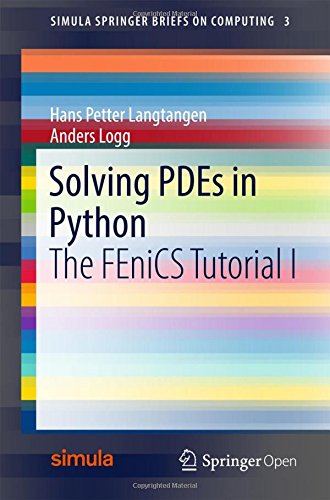
Solving PDEs in Python
by Hans Petter Langtangen, Anders Logg
Publisher: Springer 2017
Number of pages: 148
Description:
This book offers a concise and gentle introduction to finite element programming in Python based on the popular FEniCS software library. Using a series of examples, including the Poisson equation, the equations of linear elasticity, the incompressible Navier-Stokes equations, and systems of nonlinear advection-diffusion-reaction equations, it guides readers through the essential steps to quickly solving a PDE in FEniCS, such as how to define a finite variational problem, how to set boundary conditions, how to solve linear and nonlinear systems, and how to visualize solutions and structure finite element Python programs.
Download or read it online for free here:
Download link
(multiple PDF files)
Similar books
 Numerical Methods for Large Eigenvalue Problems
Numerical Methods for Large Eigenvalue Problemsby Yousef Saad - SIAM
This book discusses numerical methods for computing eigenvalues and eigenvectors of large sparse matrices. It provides an in-depth view of the numerical methods for solving matrix eigenvalue problems that arise in various engineering applications.
(14926 views)
 Computational Mathematics for Differential Equations
Computational Mathematics for Differential Equationsby N. V. Kopchenova, I. A. Maron
This is a manual on solving problems in computational mathematics. The book is intended primarily for engineering students, but may also prove useful for economics students, graduate engineers, and postgraduate students in the applied sciences.
(18776 views)
 Numerical Algorithms: Methods for Computer Vision, Machine Learning, and Graphics
Numerical Algorithms: Methods for Computer Vision, Machine Learning, and Graphicsby Justin Solomon - CRC Press
Using examples from a broad base of computational tasks, including data processing and computational photography, the book introduces numerical modeling and algorithmic design from a practical standpoint and provides insight into theoretical tools.
(10239 views)
 Notes on Numerical Linear Algebra
Notes on Numerical Linear Algebraby George Benthien
Tutorial describing many of the standard numerical methods used in Linear Algebra. Topics include Gaussian Elimination, LU and QR Factorizations, The Singular Value Decomposition, Eigenvalues and Eigenvectors via the QR Method, etc.
(14998 views)